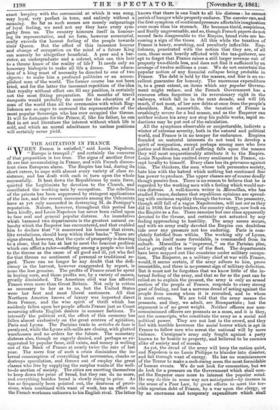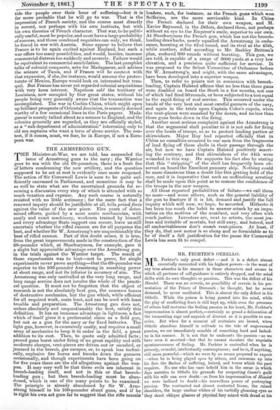THE AGITATION IN FRANCE.
WHEN France is satisfied," said Louis Napoleon, " Europe is tranquil ;" and certainly the converse of that proposition is too true. The signs of another fever fit are fast accumulating in France, and with French discon- tent rises European alarm. The Empire has had, during its short career, to cope with almost every variety of class re- sistance, and has dealt with each in turn upon the whole successfully. It beat down the Republicans by main force, quieted the Legitimists by devotion to the Church, and conciliated the working men by occupation. The rebellion of the priests has been suppressed by stringent applications of the law, and the recent movements among the Orleanists have as yet only succeeded in destroying M. de Persignv's reputation. Nature, however, throughout this period has been kindly, and Louis Napoleon has never been called upon to face real and general popular distress. An inundation which harassed two departments is the greatest natural ca- lamity which the Emperor has encountered, and that enabled him to declare that "it concerned his honour that rivers, like revolutions, should keep within their banks." There are signs abroad, however, that the cycle of prosperity is drawing to a close, that he has at last to meet the heaviest problem which can afflict a ruler—suffering among a people who look to the throne as the cause of all good and ill, yet who feel for that throne no sentiment of personal or traditional re- gard. There can no longer be any doubt that the defi- ciency in the harvest, however exaggerated by report, is none the less genuine. The profits of France must be spent in buying corn, and those profits are, by a variety of causes, greatly diminished. The American civil war has affected France even more than Great Britain. Not only is cotton as necessary to her as to us, but the United States were her best and most liberal customers. All that Northern America knows of luxury was imported direct from France, and the wise spirit of thrift which has suddenly fallen upon her people affects France just as Court mourning affects English dealers in summer fashions. To intensify the political evil, the effect of this economy has fallen almost exclusively on the great centres of agitation, Paris and Lyons. The Parisian trade in articles de luxe is paralyzed, while the Lyons silk-mills are closing, with glutted warehouses and no orders for the future. The monetary distress also, though so eagerly denied, and perhaps so ex- aggerated by popular fame, still exists, and money is welling out of the Bank of France at nearly twice the rate of last year. The mere fear of such a crisis diminishes the in- ternal consumption of everything but necessaries, checks or destroys speculation, and throws out of employ the great classes who live by supplying the surplus wants of the well- to-do section of society. The cities are exerting themselves to keep down the price of bread, but they can do no more, and everything besides bread is slowly rising in price. As has so frequently been pointed out, the dearness of provi- sions, when combined with want of work, has an effect on the French workman unknown to his English rival. The latter knows that there is one limit to all his distress : he cannot perish of hunger while property endures. The ouvrier can, and the first symptom of eontinuedpressure affects his imagination even more than his stomach. He becomes timid, suspicious, and finally ungovernable, and so, though French papers do not record facts disagreeable to the Empire, bread riots are be- coming a sign of the times. All this while the taxation of France is heavy, searching, and peculiarly inflexible. Eng. lishmen, penetrated with the notion that they are, of all men, those most heavily afflicted with the tax-gatherer, are apt to forget that France raises a still larger revenue out of property two-thirds less, and does not find it sufficient by an average of twelve millions a year. We do not entertain the popular notion of any financial collapse being probable in France. The debt is held by the masses, and fear is an ex- cellent guarantee for honesty. The enormous expenditure is, to a great extent, on items which any popular Govern- ment might reduce, and the French Government has a resource often forgotten in its reversionary right in the railways, which fall in in the next decade, and will lift much, if most, of her new debts at once from the people's shoulders. But, meanwhile, the taxation of France is crushingly severe for a bad season, and as the Emperor can neither reduce his army nor stop his public works, rapid re- ductions may be put out of the calculation. All the symptoms observable or conjecturable, indicate a winter of extreme severity, both in the natural and political world, and France is in no temper for endurance. Empires founded on material interests do not tend to develop a spirit of resignation, except perhaps among men who love justice and freedom, and if suffering falls upon the masses they will most unquestionably attribute it to the Empire. Louis Napoleon has excited every sentiment in France, ex- cept loyalty to himself. Every class has its grievance against him. The thinkers, the men whose talk permeates society, hate him with the hatred which nothing but continued fear has power to produce. The upper classes are of course deadly though passive foes. There is no reason to believe that he is regarded by the working men with a feeling which would sur- vive distress. A well-known writer in _Macmillan, who has studied France, declares that republican opinions are spread- ing with ominous rapidity through the towns. The peasantry, though still full of a vague Napoleonism, will not act as they did in 1850, for their leaders, the country clergy, now look on the Empire as a foe. There remains but one class apparently devoted to the throne, and certainly not actuated by any feeling approaching to hostility. The army seems secure, and with an army really devoted the Empire can doubtless tide over any pressure not too enduring. Paris is com- pletely fortified from within. The working city of Lyons, though in itself more formidable, is commanded from its suburb. Marseilles is " improved, " on the Parisian plan, and is greatly at the mercy of the fleet. The departments have been mapped out like countries under military occupa- tion. The Emperor, as a military chief at war with France, would, it seems certain, if the army adhere to him, prove irresistible, and there is no present sign of military defection. But it must not be forgotten that we know little of the in- ternal feeling of the army, and that so far as the past can be relied on to explain the present, the army is only an armed section of the people of France, responds to every strong gust of feeling, and has a nervous dread of acting against the people from among whom it is recruited, and to whom it must return. We are told that the army means the peasants, and they, we admit, are Bonapartists ; but the argument is of no great weight. Neither officers nor non- commissioned officers are peasants as a mass, and it is they, not the conscripts, who constitute the army as a social and political power. They are not lost in the crowd, and they feel with terrible keenness the social horror which is apt in France to follow men who arrest the national will by mere violence. Cavaignac's army only fought against a party known to be hostile to property, and believed to be enemies alike of society and of morals.
As yet, the dread of the army will keep the nation quiet, and Napoleon is no Louis Philippe to blunder into disaster, and fail through want of energy. He has no reminiscences of the Terror to make a mob-rising seem the most formidable of human events. We do not look for commotion, but we do look for a pressure on the Government which shall com- pel the Emperor once more to interest the popular mind. He may do this in some way not anticipated—by decrees in the sense of a Poor Law, by great efforts to meet the ter- rible agrarian debt of France, by a war upon the clergy, or by an enormous and temporary expenditure which, shall tide the people over their hour of suffering—but it is far more probable that he will go to war. That is the impression of French society, and the course most directly in accord, not perhaps with his own instincts, but with his own theories of French character. That war, to be politi- callyuseful, must be popular, and must have a large probability of success, and those combined requisites can only, we think, be found in war with Austria. Some appear to believe that France is to be again excited against England, but such a war offers too many possibilities, and would, besides, increase commercial distress too suddenly and severely. Failure would be equivalent to commercial annihilation. The last pamphlet talks of colonial conquests, asks for Madagascar, and advises the seizure of Tunis, and if France will be content with that expansion, if she, for instance, would assume the protec- torate of Mexico, Europe would look on interested but tran- quil. But France has never yet regarded colonial acquisitions with very keen interest. Napoleon sold the territory of Louisiana, now occupied by four great states, without his people being very generally aware that the transaction was accomplished. The war in Cochin China, which might open up brilliant prospects of Oriental dominion, is scarcely deemed worthy of a few occasional lines in the Paris papers. Mada- gascar is merely talked about as a menace to England, and the colonies generally are regarded, as they are officially styled, as a " sub-department of administration" interesting only to old sea captains who want a term of shore service. The con- test, if it comes, must, we fear, be in Europe, if not a Euro- pean war.































 Previous page
Previous page